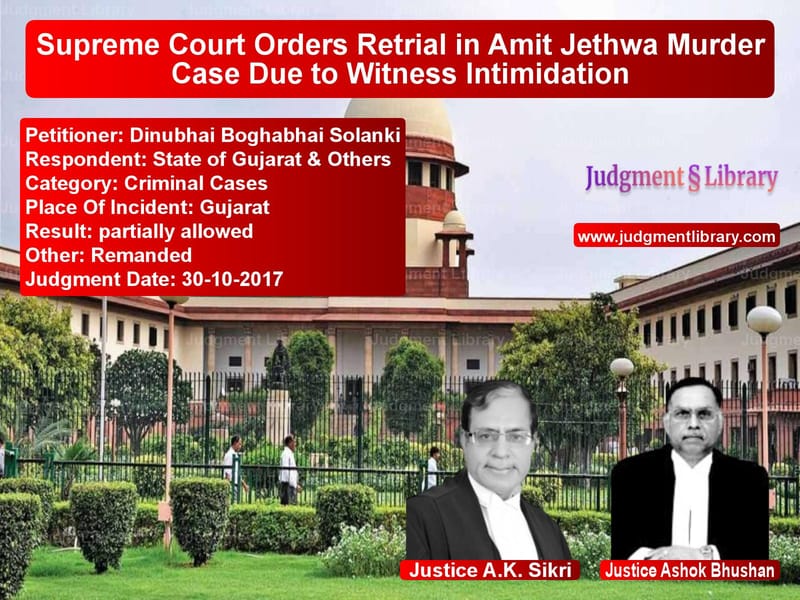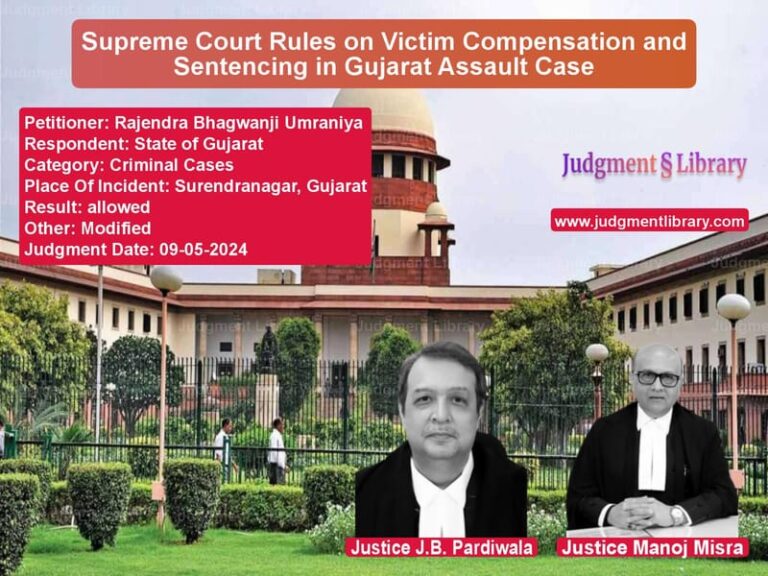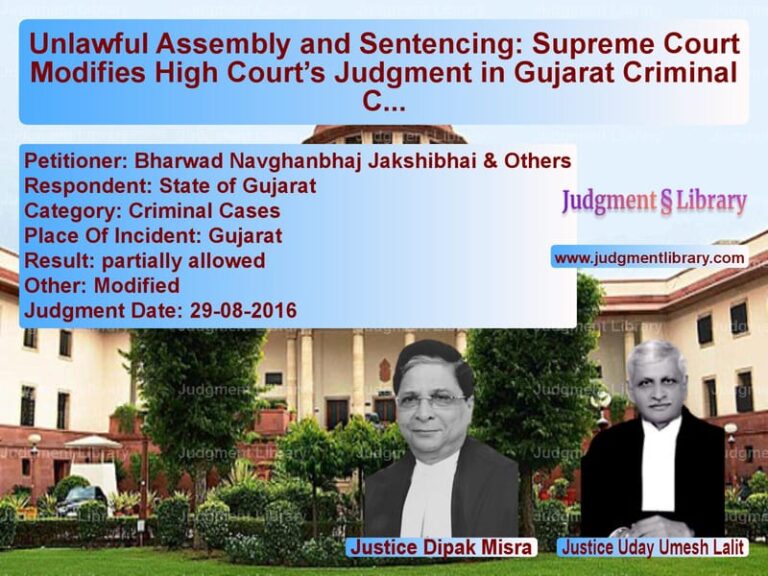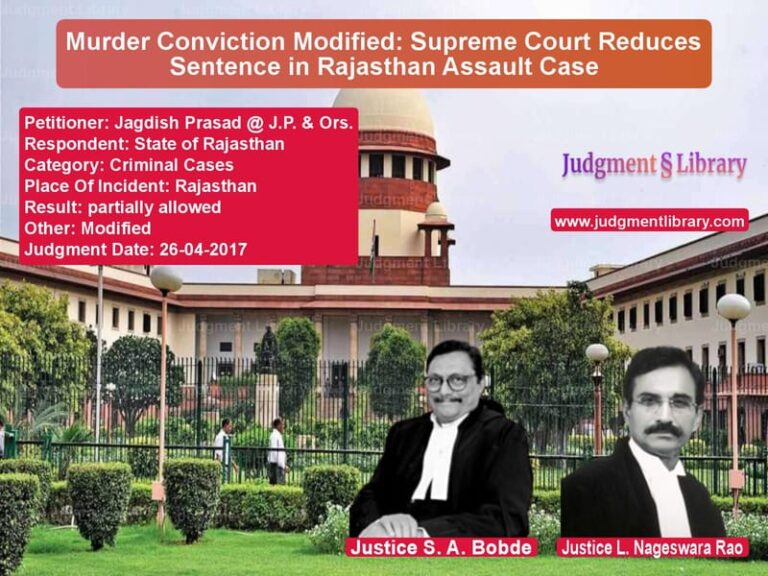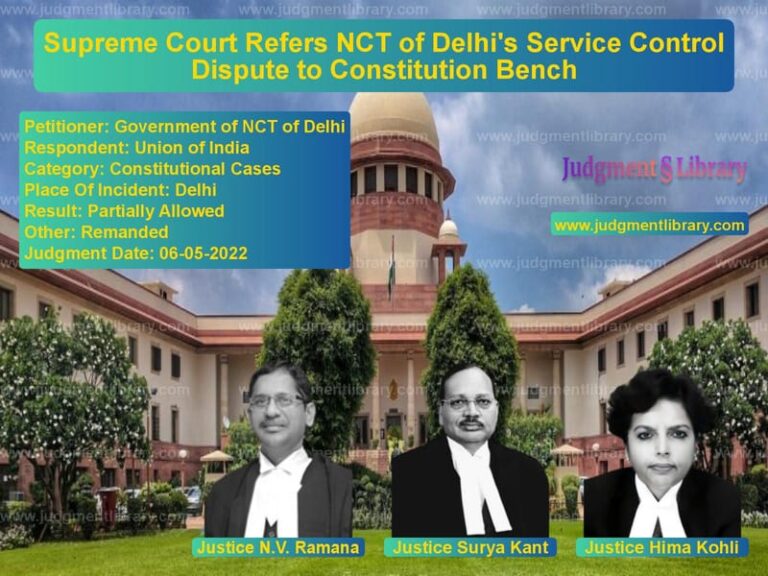Supreme Court Orders Retrial in Amit Jethwa Murder Case Due to Witness Intimidation
The Supreme Court of India, in the case of Dinubhai Boghabhai Solanki vs. State of Gujarat & Others, addressed a high-profile criminal case involving the murder of environmental activist Amit Jethwa. The judgment, delivered on October 30, 2017, focused on ensuring a fair trial after multiple witnesses, including key eyewitnesses, turned hostile. The Court found credible evidence that witnesses had been threatened and intimidated, leading to its decision to order a retrial.
The case revolved around Amit Jethwa, an activist who had been actively campaigning against illegal mining in and around the Gir Forest Sanctuary. On July 20, 2010, he was murdered outside the Gujarat High Court. The police registered an FIR under Sections 302 and 114 of the Indian Penal Code (IPC) and Section 25(1) of the Arms Act. The investigation faced significant hurdles, with allegations that law enforcement authorities were not conducting an impartial inquiry. As a result, the Gujarat High Court transferred the case to the Central Bureau of Investigation (CBI) in 2012.
Petitioner’s Arguments
The petitioners, including Amit Jethwa’s father, contended that:
- The police investigation was compromised, as it failed to implicate the primary accused despite strong evidence.
- The accused, Dinubhai Boghabhai Solanki, was a powerful former Member of Parliament with considerable influence over law enforcement agencies.
- The murder was a direct consequence of Jethwa’s activism against illegal mining activities.
- Witnesses were systematically threatened, resulting in a large number of them turning hostile.
- The trial had become a mere formality, with the prosecution unable to secure truthful testimonies.
- The right to a fair trial was being severely undermined due to intimidation tactics.
- The Supreme Court needed to intervene and ensure that justice was served by ordering a fresh trial.
Respondent’s Arguments
The respondents, including the accused and the State of Gujarat, argued that:
- There was no direct evidence linking Dinubhai Boghabhai Solanki to the murder.
- The case had already undergone extensive investigation, and reopening it would be an unnecessary delay.
- The testimonies of witnesses who had turned hostile were not conclusive evidence of coercion.
- The defense had a right to rely on the existing record of the trial.
- Re-examining witnesses could lead to procedural delays and unfairly disadvantage the accused.
Key Observations by the Court
The Supreme Court ruled in favor of the petitioner, emphasizing that the right to a fair trial is paramount. The bench observed:
“A fair trial is the cornerstone of justice, and if witnesses turn hostile due to intimidation, the entire process becomes a mockery of the judicial system.”
The Court further noted:
- Out of 195 prosecution witnesses, a staggering 105 witnesses had turned hostile.
- This included 8 key eyewitnesses, all of whom had initially provided statements that were later retracted in court.
- The lower court judge had failed to take adequate measures to ensure the safety and security of witnesses.
- The CBI, in multiple affidavits, confirmed that witness intimidation was rampant, with specific threats being issued to deter testimony.
- The fundamental principle of a fair trial requires that both the accused and the victim’s family have confidence in the judicial process.
Final Judgment
The Supreme Court directed:
“The trial court shall conduct a partial retrial, recalling and re-examining 26 witnesses, including 8 key eyewitnesses, to ensure that their testimonies are recorded without fear or coercion.”
The Court also ruled:
“The main accused, Dinubhai Boghabhai Solanki, shall remain in custody until the key eyewitnesses have testified. After this, he may be released on bail with conditions preventing him from influencing the trial.”
Implications of the Judgment
This ruling is significant for several reasons:
- It reaffirms the Supreme Court’s commitment to ensuring fair trials in high-profile cases.
- It acknowledges the growing problem of witness intimidation in India and highlights the need for stronger witness protection mechanisms.
- It sets a precedent for other cases where witness tampering may be a concern.
- It strengthens the role of the judiciary in intervening when trials are compromised.
Conclusion
This judgment is a landmark decision reinforcing the importance of fair trials. It acknowledges the growing issue of witness intimidation in India and sets a precedent for ensuring that the judicial process remains transparent and impartial. The Supreme Court’s ruling highlights the need for judicial vigilance in high-profile cases, where powerful individuals may attempt to obstruct justice.
The ruling also underscores the Supreme Court’s commitment to upholding the rule of law, even in cases involving influential figures. By ordering a retrial, the Court has sent a clear message that witness intimidation will not be tolerated, and justice must be delivered fairly and impartially.
The judgment also calls for stricter measures to prevent witness intimidation and ensure that trials are conducted in an environment where witnesses can testify freely and truthfully. It highlights the urgent need for legal reforms to strengthen witness protection laws in India.
Going forward, this case will serve as a benchmark for similar cases where witness intimidation is suspected. The judiciary’s role in upholding justice remains crucial, and this ruling ensures that the balance of justice is maintained in favor of truth and fairness.
Don’t miss out on the full details! Download the complete judgment in PDF format below and gain valuable insights instantly!
Download Judgment: Dinubhai Boghabhai S vs State of Gujarat & O Supreme Court of India Judgment Dated 30-10-2017.pdf
Direct Downlaod Judgment: Direct downlaod this Judgment
See all petitions in Murder Cases
See all petitions in Bail and Anticipatory Bail
See all petitions in Custodial Deaths and Police Misconduct
See all petitions in Judgment by A.K. Sikri
See all petitions in Judgment by Ashok Bhushan
See all petitions in partially allowed
See all petitions in Remanded
See all petitions in supreme court of India judgments October 2017
See all petitions in 2017 judgments
See all posts in Criminal Cases Category
See all allowed petitions in Criminal Cases Category
See all Dismissed petitions in Criminal Cases Category
See all partially allowed petitions in Criminal Cases Category

